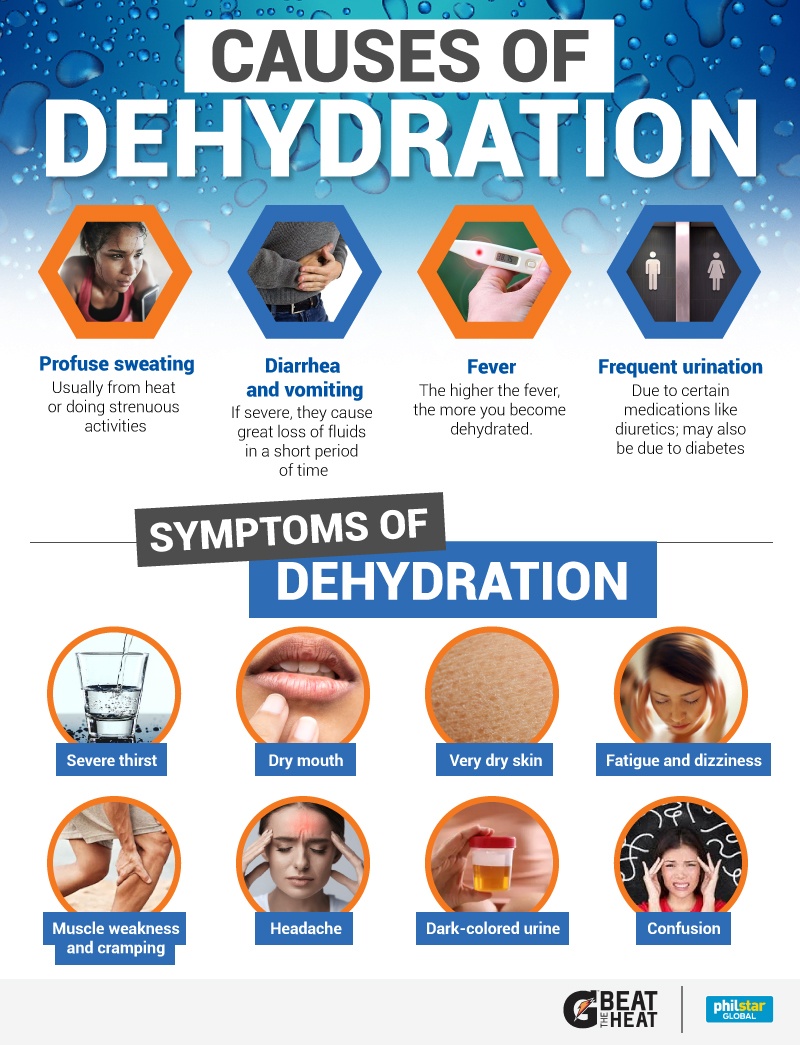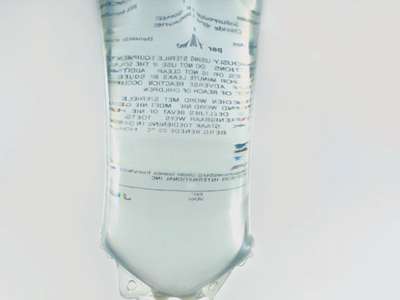Some conditions occur in the body that we may not be aware of until they become critical. One of these is dehydration. It is essential to know the signs of dehydration in order to correct the situation before it becomes severe. This article will shed light on dehydration: the facts.
What is Dehydration?
Dehydration is the body not having a sufficient amount of fluid for it to function correctly. Dehydration takes place when there is a fluid deficit; the body loses more fluid than it is taking in.
What is the Cause of Dehydration?
Dehydration takes place when the body loses excessive amounts of fluid. Common causes can include:
- diarrhea
- excessive sweating
- vomiting
The recommendation for women is to consume 92 fluid ounces (11.5 cups) per day and for men to consume 124 fluid ounces (15.5 cups) per day. Individuals on the go, athletes and individuals exposed to high temperatures need to increase their water
intake to evade dehydration.
When too much water is lost from the body, the organs, cells, and tissues fail to function as they should, leading to dangerous complications. If dehydration is not corrected immediately, it may cause shock.
Dehydration may be severe or mild. Mild dehydration is usually treatable at home. However, severe dehydration needs treatment in a hospital or emergency care setting.
Sports contestants exposed to the direct sun are not the only ones susceptible to dehydration. Bodybuilders and swimmers are among the athletes who frequently develop the condition as well. It is even possible to sweat in the water! Swimmers leave behind a lot of sweat when they are swimming.
Some individuals have an increased risk for developing dehydration than others, which include:
- athletes (especially cyclists, runners, and soccer players)
- elderly adults
- individuals who reside in high altitudes
- individuals with chronic conditions
- individuals working outdoors exposed to excessive amounts of heat (e.g., construction workers, landscapers, mechanics, and welders)
- young children, and infants
The body loses water on a regular basis through sweating and urination. If the fluid is not replenished, dehydration takes place. Any condition or situation that causes the body to lose more water than usual can lead to dehydration.
Sweating
Sweating is part of the body’s normal cooling process. When the body becomes heated, the sweat glands activate to release moisture body in an attempt to cool off. The way this works is through the process of evaporation.
When a drop of sweat evaporates from the skin, it takes a small amount of heat with it. The more sweat produced, the more evaporation commences, and the more cooling takes place. Sweating additionally hydrates the skin and maintains the balance of electrolytes in the body.
The fluid in sweat encompasses mainly salt and water. Extreme sweating can cause dehydration since large amounts of water are lost. The medicinal name for extreme sweating is hyperhidrosis.
Illness
Illnesses that produce perpetual vomiting or diarrhea may result in  dehydration. This condition occurs since vomiting and diarrhea can cause excessive water to be removed from the body.
dehydration. This condition occurs since vomiting and diarrhea can cause excessive water to be removed from the body.
Essential electrolytes are additionally lost through these processes. Electrolytes are minerals utilized by the body to manage the muscles, blood chemistry, and organ processes. These electrolytes can be found in urine, blood, and other fluids in the body.
Vomiting or diarrhea may impair these roles and cause dangerous complications, such as stroke and coma.
Fever
When an individual has a fever, the body loses fluid through the skin’s surface in an effort to lower the temperature. Frequently, fever can cause an individual to sweat to the point that if enough liquid is not consumed to replenish what is lost, they could become dehydrated.
Urination
Urination is the body’s usual way to discharge toxins from the body. A few conditions may cause chemical imbalances, which can increase urine output. If the fluid lost through excessive urination is not replaced, there is a risk of developing dehydration.
What are the Symptoms for Dehydration
The indicators of dehydration vary depending on whether the condition is mild or severe. Indications of dehydration can begin to appear prior to full dehydration commences.
Symptoms of mild to fair dehydration encompass:
- constipation
- decreased urination
- dizziness
- dry mouth
- dry skin
- fatigue
- headache
- increased thirst
- less tear production
- lightheadedness
Severe dehydration is likely to cause the following in addition to the symptoms of mild dehydration:
- dark urine
- excessive thirst
- lack of sweat production
- low blood pressure
- rapid breathing
- rapid heart rate
- shriveled skin
- sunken eyes
Severe dehydration is a serious medical emergency. An individual should seek immediate medical help if they are showing any of these signs and symptoms.
Further, the elderly, as well as children and, should receive immediate treatment, even if they are only experiencing symptoms of mild dehydration.
If an individual in any age group develops any of the following symptoms, they should seek emergency care:
- severe diarrhea
- blood in the stool
- diarrhea for three (3) or more days
- have the inability to keep fluids down
- disorientation
How is Dehydration Diagnosed?
Before commencing any tests, a physician will review any symptoms present to rule out other conditions. After noting a medical history, the physician will check the vital signs, including heart rate and blood pressure. Low blood pressure and rapid heart rate may point to dehydration.
The physician may use a blood test to check the level of electrolytes, which can help be a sign of fluid loss. A blood test can additionally check the body’s level of creatinine. This test assists the doctor in determining how well the kidneys are performing, which is an indication of the degree of dehydration.
A physician may also use a urinalysis, which is an exam that utilizes a sample of urine to check for bacteria and electrolyte loss. The color of urine can additionally indicate dehydration when considered with other symptoms. Dark urine cannot alone produce a diagnosis for dehydration.
Treating Dehydration

Treating dehydration includes rehydrating techniques, electrolyte replenishment, and the treatment of diarrhea or vomiting if necessary.
Rehydration – Rehydration by drinking may not be feasible for all individuals, such as severe diarrhea or vomiting. In this case, fluids would be given intravenously.
This function is performed by inserting a small IV tube in a vein in the arm or hand. It supplies a solution that is usually a mix of water and electrolytes.
For individuals able to drink, ingesting water along with an electrolyte-containing rehydration drink, such as a low-sugar sport or electrolyte drink (e.g., Gatorade), may be suggested. Children with dehydration are frequently advised to drink Pedialyte.
Oral Rehydration Therapy
In the event an electrolyte drink is not available, a solution can be formed using:
- 1/2 teaspoon salt
- Six teaspoons sugar
- 1-liter water
Be sure to use precise measurements as using more than the recommended amounts of salt or sugar can be dangerous.
Preventing Dehydration
The greatest way to avoid dehydration is to consume plenty of fluids, especially when in a hot climate or playing, exercising, or working in the sun. It is advisable to observe the amount of fluid lost through perspiration (sweating) and urination. It is best to consume enough fluids to keep up with what the body is losing.
Additionally, fresh and frozen fruits and vegetables make an ideal hydrating

snack due to their high water content of 80–99% water.
For the sake of comparison, research
has shown that highly processed foods such as crackers, cereals, cookies, and chips contain only 1–9% water.
Fruits and vegetables with the most significant water capacity include:
- berries
- cabbage
- carrots
- grapes
- lettuce
- melons
- oranges
- spinach
Keep various fresh fruits and vegetables on hand for easy and handy access.
It is important to note that frozen fruits and vegetables have the same nutritional value as their fresh counterparts, and in some cases, they are more nutritious.
Because of the amount of the time involved for fruits and vegetables to reach our homes, oxidation can cause nutrient loss. In contrast, frozen fruits and vegetables are frozen soon after harvesting, retaining most of their nutrients.
For example, one study revealed that frozen green beans and blueberries included more vitamin C than their fresh equivalents.
Summary
Since hydration supports a host of bodily functions, affecting everything from mental cognition to sex performance, we must pay attention to our hydration condition.
Please feel free to leave any questions, comments, concerns, or experiences with dehydration below.
Good Health!!
What a fascinating article. I never realized that not staying hydrated could have such terrible consequences. I know in the past that I have become mildly dehydrated when out horse riding. It’s actually hard to detect as you are sitting down and often consider that you are resting when your body is actually in constant motion. My father always sweated profusely and I am the same so I make sure that I drink lots of fluids before going out for a ride and straight away after to top up before any symptoms appear.
Lots of great advice thanks. Can you drink too much water?
Hi Lily – Yes, you can drink too much water, although it doesn’t happen that frequently. But when you do drink too much water, your kidneys can’t get rid of the excess water. The sodium content of your blood becomes diluted. This condition is called hyponatremia, and it can be life-threatening.
Thanks for commenting!
Dehydration is not taken as seriously as it should be. This article will definitely help individuals understand it better and understand how serious it is. It is a very informative and well-written post. It’s so interesting to see the articles that people come up with so thank you for this.
You are welcome Daniel. Yes most do not consume the required water intake.
Thanks again for your comments!